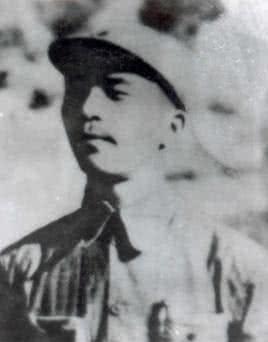"China's Xia Boyang" - this is Marshal Ye Jianying's evaluation of Bao Sen.
At the age of 16, at a memorial meeting held by the progressive forces of the school to mourn Li Dazhao, he took to the stage to denounce the crimes of the warlord Zhang Zuolin; at the age of 20, because Chiang Kai-shek did not resist the policy, he took the lead in rushing into the Kuomintang department of Jingyang County and smashing the county party department sign. He also wisely captured The cousin of Emperor Hirohito of Japan and the commander of the gendarmerie, Daisaku Akamoto; when he died, the Japanese army also respected him, and in all the newspaper propaganda reports, the slanderous attack words were removed and a solemn report was made that "Commander Baosen was killed in battle".
Today, I will approach the anti-Japanese hero Bao Sen with the history of leisure:

On July 21, 1911, Bao Sen was born in Pucheng, Shaanxi, whose original name was Zhao Baosen, came from a poor family, and he ranked third among 6 brothers and sisters. Fortunately, no matter how poor and miserable the family was, his parents did not give up his education. Bao Sen grew up reading private pads, in 1927 Bao Sen entered the first high school in Pucheng County, books are his best teacher, when he was a child he liked the various interpretations of history, knew what justice is, and then began to read progressive books and periodicals, know how to save China.
In 1927, Li Dazhao was brutally killed by a reactionary warlord, and the progressive forces of Bao Sen's school held a memorial meeting to mourn Li Dazhao, a 16-year-old boy who took to the podium to denounce the crimes of the warlord Zhang Zuolin, which was praised by the vast number of progressive teachers and students; in 1931, when Japanese imperialism created the September 18 Incident and invaded northeast China, Chiang Kai-shek adopted a reactionary policy of non-resistance. Patriotic students of The Baosen United School formed a propaganda team, held demonstrations in Sanyuan, Jingyang and other places, and took the lead in rushing into the Kuomintang department in Jingyang County to demand that the Kuomintang government resist Japan. After being refused, he smashed the county party sign in a fit of rage...
Because of this, the young Bao Sen was imprisoned twice, but he never gave up. After graduating from Yan'an Kang University, Bao Sen was assigned to the local task force of the Independent First Division of the Eighth Route Army in Jin-Cha-Ji:
Bao Sen gradually grew into a force to be reckoned with in the anti-Japanese resistance. In June 1938, Bao Sen led more than 40 people to Jidong to open up anti-Japanese guerrilla zones in the Xinglong area of Hebei Province. Many Japanese wanted to completely annihilate the squad, including the Japanese Emperor's cousin and gendarme Ōsa Akamoto. In 1939, the younger brother of the Then Emperor of Japan, Fuji I, developed what he considered perfect tactics and personally led a large army deep into the hinterland of our army to begin the journey of capturing Bausen alive.
Wanwan did not expect that the Bausen Department had already transferred and laid out pockets for him, and this arrogant son of the Japanese imperial family had become a prisoner of the order, which greatly boosted the morale of the Chinese anti-Japanese army, but it shocked the Japanese government and the public who were far away in Tokyo.
In February 1940, Bao Sen led his troops to Panshan and went all out to open up the Panshan Anti-Japanese Base Area, and after a year of bloody struggle, seven joint county governments were established in Panshan Area, with a population of more than 2 million. In 1942, at the Battle of Neiguo River at the Yanshan Pass, Bao Sen killed and captured nearly a thousand officers and men below the enemy's pseudo-Zhongzuo with the strength of seven companies, creating a miracle of winning more with less and defeating the strong with the weak. In the mouths of the people of Jidong, he was the amiable "Bao Captain", "Bao Commander", and "Bao Regiment Leader", while Rikou used the mantra of "going out to fight and encountering Lao Bao".
Unfortunately, on February 17, 1942, Bao Sen led his troops to meet the enemy at Zunhua Wild Tiger Mountain. During the battle, when he went up the North Mountain to observe the enemy situation with a telescope, he was shot in the chest by the enemy sniper's cold gun. Bauson's last words for the world were"
I was wounded and the line was commanded by a battalion commander
", at the age of 31.
After the news of Bao Sen's sacrifice came out, the entire party, government, and military of Eastern Ji were immersed in great grief. After learning of this news, the Japanese army also unusually removed the slanderous attack words in the propaganda reports of all newspapers and made a solemn report that "Commander Bausen was killed in battle!!!
Tribute, anti-Japanese hero Bausen.